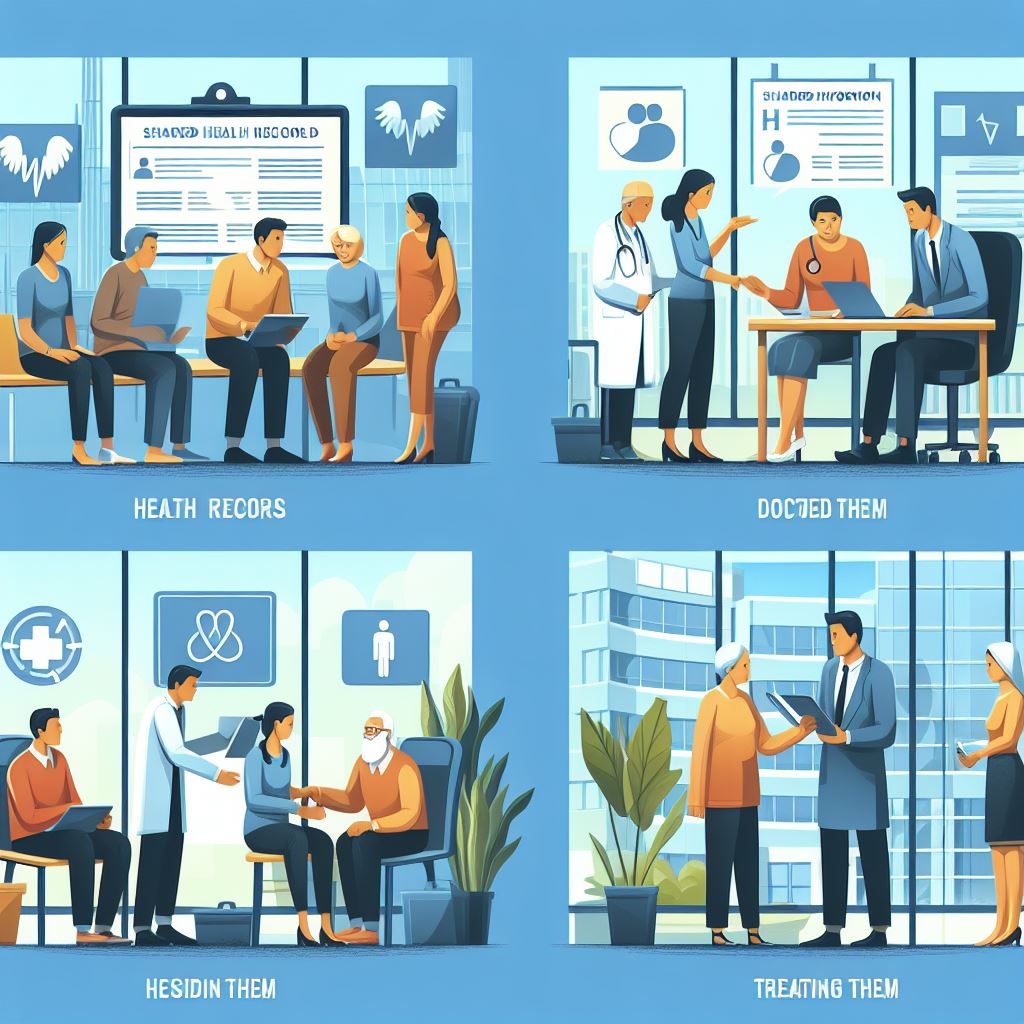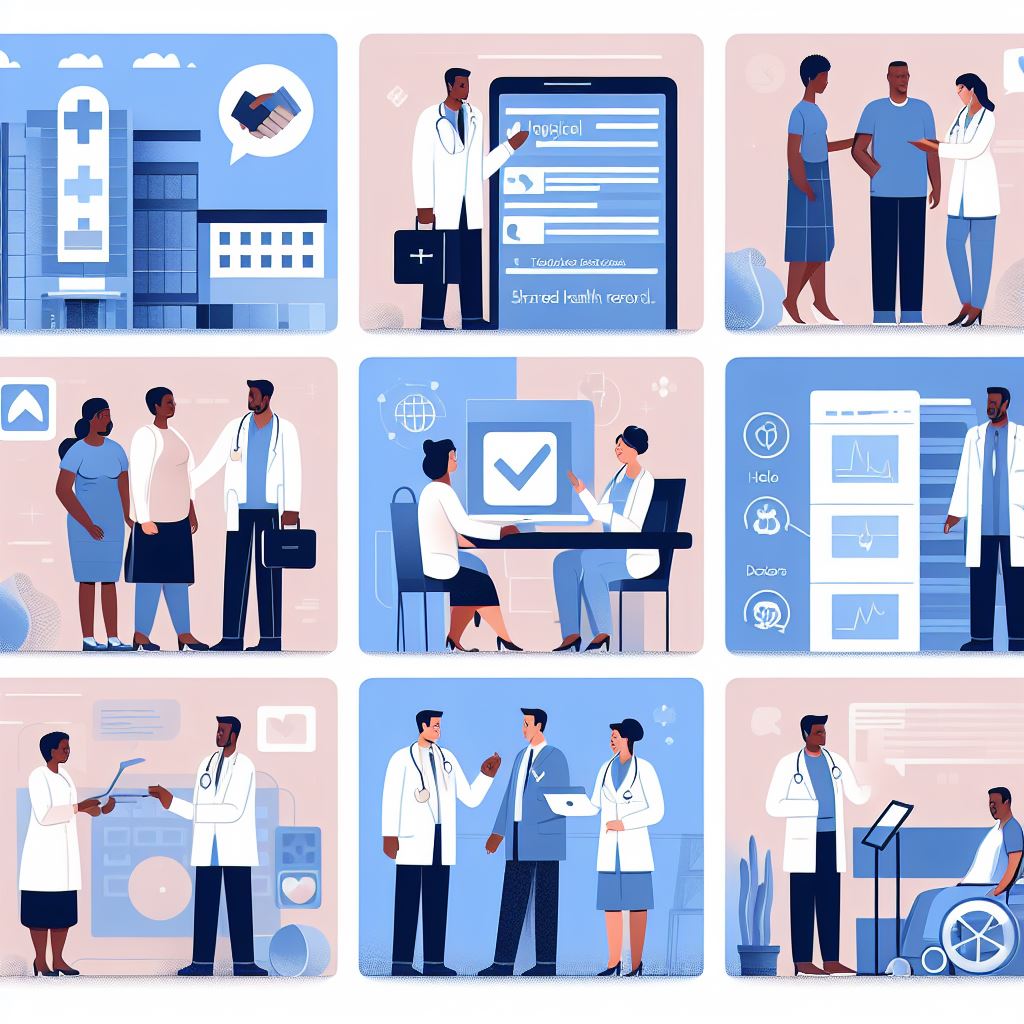Pioneering Excellence in Healthcare Management: Unveiling the HC Provider Systems in Share Health Record Bangladesh HRIS

In the dynamic realm of healthcare, efficient management of healthcare providers is crucial for delivering optimal patient care. Share Health Record Bangladesh introduces a revolutionary Human Resource Information System (HRIS) with advanced Health Care (HC) Provider Systems, designed to streamline provider management, enhance operational efficiency, and elevate the overall quality of healthcare services. 1. Centralized Provider Management: The Core of HC Provider Systems Share Health Record Bangladesh’s HC Provider Systems within the HRIS centralize the management of healthcare providers, offering a comprehensive solution for recruitment, credentialing, and ongoing provider lifecycle management. This centralized approach ensures that healthcare organizations can efficiently oversee their provider network, minimizing administrative overhead and optimizing provider performance. Key Features of HC Provider Systems in Share Health Record Bangladesh: Credentialing and Onboarding: The system facilitates the streamlined credentialing of healthcare providers, ensuring compliance with industry standards and regulations. The onboarding process is also optimized, enabling quick integration of new providers into the healthcare network. Performance Tracking: HC Provider Systems offer robust performance tracking tools, allowing healthcare organizations to monitor and evaluate provider performance against key performance indicators (KPIs). This data-driven approach facilitates continuous improvement and ensures the delivery of high-quality care. Provider Scheduling: The system includes scheduling tools that optimize provider availability, ensuring that healthcare organizations can efficiently manage appointments, shifts, and rotations. This feature contributes to improved patient access and operational efficiency. Training and Certification Management: HC Provider Systems support the tracking of provider certifications and training requirements. This ensures that healthcare professionals remain up-to-date with the latest industry standards and are equipped to deliver the highest level of care. 2. Enhanced Operational Efficiency: The integration of HC Provider Systems into Share Health Record Bangladesh’s HRIS significantly enhances operational efficiency within healthcare organizations. By automating provider-related processes and consolidating data, healthcare administrators can devote more time to patient care and strategic decision-making. Reduced Administrative Burden: Manual administrative tasks, such as paper-based credentialing and onboarding processes, are replaced with automated workflows. This reduction in administrative burden allows healthcare administrators to allocate resources more effectively and focus on optimizing patient care delivery. Improved Provider-Patient Matching: HC Provider Systems contribute to more effective provider-patient matching. By considering provider expertise, availability, and patient needs, the system ensures that patients are connected with the most suitable healthcare professionals, resulting in improved patient outcomes. Real-Time Data Access: The HRIS with HC Provider Systems provides real-time access to provider data, enabling healthcare administrators to make informed decisions promptly. This timely access to information is crucial for addressing operational challenges, optimizing staffing levels, and ensuring a seamless healthcare delivery process. 3. Data-Driven Decision-Making: A key advantage of HC Provider Systems within Share Health Record Bangladesh’s HRIS is their capacity for data-driven decision-making. By leveraging advanced analytics, healthcare organizations can gain valuable insights into provider performance, patient satisfaction, and operational trends. Performance Analytics: The system generates comprehensive performance analytics, allowing healthcare administrators to evaluate individual provider performance and identify opportunities for improvement. This data-driven approach contributes to a culture of continuous quality enhancement. Strategic Workforce Planning: HC Provider Systems support strategic workforce planning by providing insights into provider availability, skill sets, and certifications. This information is invaluable for optimizing staffing levels, ensuring adequate coverage, and responding effectively to fluctuations in patient demand. Compliance Monitoring: The system includes features for monitoring provider compliance with regulatory requirements and organizational policies. This proactive approach to compliance management reduces the risk of legal issues and ensures a secure and transparent healthcare environment. 4. Future-Ready Solutions: As the healthcare landscape evolves, Share Health Record Bangladesh remains committed to providing future-ready solutions. The ongoing development of HC Provider Systems within the HRIS includes plans for the integration of artificial intelligence (AI) capabilities. These AI-driven features aim to further enhance predictive analytics, workforce optimization, and provider performance management. Conclusion: In conclusion, the HC Provider Systems integrated into Share Health Record Bangladesh’s HRIS represent a groundbreaking advancement in healthcare workforce management. By centralizing provider management, enhancing operational efficiency, and promoting data-driven decision-making, these systems contribute to a more effective and patient-focused healthcare ecosystem. As Share Health Record Bangladesh continues to lead the way in healthcare innovation, the HC Provider Systems within the HRIS stand as a testament to the platform’s commitment to excellence in healthcare delivery. Stay tuned for further updates as Share Health Record Bangladesh shapes the future of healthcare provider management.
Elevating Healthcare through Innovation: A Deep Dive into the Health Care ID Provider of Share Health Record Bangladesh

Abstract: This research paper delves into the transformative impact of the Health Care ID Provider within Share Health Record Bangladesh. As a pioneering component of the platform, the Health Care ID Provider is examined for its role in revolutionizing patient identification, streamlining healthcare access, and enhancing overall patient-centric care. This paper provides a comprehensive analysis of the Health Care ID Provider’s contribution to a more connected and effective healthcare ecosystem in Bangladesh. Introduction: Share Health Record Bangladesh has set a new standard in healthcare innovation with its Health Care ID Provider. This unique identifier system is designed to streamline patient identification, ensure secure access to health records, and elevate the overall patient experience within the healthcare landscape of Bangladesh. Revolutionizing Patient Identification: At the core of the Health Care ID Provider is its ability to revolutionize patient identification. Each citizen is assigned a secure and unique health identifier, streamlining the patient registration process and eliminating the challenges associated with traditional identification methods. This innovation ensures accuracy in patient records and facilitates seamless data sharing among healthcare providers. Streamlining Healthcare Access: The Health Care ID Provider plays a pivotal role in streamlining access to healthcare services. With a single, unified identifier, patients can easily navigate the healthcare system, schedule appointments, and access their health records. This streamlined process not only reduces administrative burdens but also enhances the overall efficiency of healthcare delivery, resulting in improved patient satisfaction. Enhancing Patient-Centric Care: Central to the Health Care ID Provider’s impact is its contribution to patient-centric care. By providing healthcare providers with instant access to a patient’s comprehensive health history, treatment plans can be personalized and tailored to individual needs. This patient-centric approach fosters a more empathetic and responsive healthcare system, ultimately leading to better health outcomes. Interoperability and Data Exchange: The Health Care ID Provider within Share Health Record Bangladesh promotes interoperability and seamless data exchange among healthcare providers. This interconnected system enables healthcare professionals to access patient information across different healthcare facilities, ensuring continuity of care and reducing the likelihood of redundant tests or treatments. Data Security and Privacy Compliance: Recognizing the critical importance of data security and patient privacy, the Health Care ID Provider is designed with robust security measures. Compliance with privacy regulations ensures that patient information is handled with the utmost confidentiality, building trust between patients and healthcare providers. This commitment to security is fundamental to the success and widespread adoption of the Health Care ID Provider. Positive Impacts on Healthcare Ecosystem: The implementation of the Health Care ID Provider has demonstrated positive impacts on the broader healthcare ecosystem. From reducing administrative overhead to improving the accuracy of patient records, this innovative solution contributes to operational efficiency, making healthcare more accessible and patient-friendly. Conclusion: In conclusion, the Health Care ID Provider within Share Health Record Bangladesh stands as a beacon of innovation, reshaping the healthcare landscape in Bangladesh. By revolutionizing patient identification, streamlining healthcare access, and enhancing patient-centric care, this unique identifier system exemplifies the platform’s commitment to connectivity, efficiency, and improved health outcomes. As the nation progresses toward a modern healthcare ecosystem, the Health Care ID Provider is undeniably a key driver of positive change, fostering a more connected and patient-focused approach to healthcare delivery.
Optimizing Healthcare Operations: A Comprehensive Analysis of the Facility Registry in Share Health Record Bangladesh

Abstract: This research paper explores the transformative impact of the Facility Registry within Share Health Record Bangladesh. As an integral component of the platform, the Facility Registry is examined for its role in streamlining healthcare operations, optimizing resource allocation, and enhancing overall efficiency. This paper provides a comprehensive analysis of the Facility Registry’s contribution to a more connected and effective healthcare ecosystem in Bangladesh. Introduction: In the pursuit of a more efficient and patient-centric healthcare system, Share Health Record Bangladesh has introduced the Facility Registry as a key feature. This registry aims to optimize healthcare operations by providing a centralized hub for managing and accessing critical information about healthcare facilities across the country. Streamlining Resource Allocation: A core function of the Facility Registry is the optimization of resource allocation within healthcare institutions. By centralizing information about available resources, such as medical equipment, personnel, and bed capacities, healthcare providers can make informed decisions about resource utilization. This streamlined approach minimizes inefficiencies, reduces bottlenecks, and ensures that resources are allocated where they are needed most. Enhancing Appointment Scheduling: The Facility Registry within Share Health Record Bangladesh plays a pivotal role in appointment scheduling. Integrated into the platform, the registry allows healthcare providers to manage and coordinate appointment slots efficiently. Patients benefit from reduced wait times and a more organized scheduling process, leading to an overall improvement in the patient experience and satisfaction. Optimizing Workflow: Facility Registry contributes to operational efficiency by optimizing workflow within healthcare institutions. Through real-time updates on patient admissions, discharges, and transfers, healthcare providers can adapt their workflows to current demand. This adaptability reduces delays, enhances communication among healthcare professionals, and ensures a smoother overall operation of healthcare facilities. Improving Data Accessibility: One of the key advantages of the Facility Registry is its role in improving data accessibility. By consolidating information about healthcare facilities, the registry ensures that healthcare providers have quick and easy access to essential data. This accessibility is crucial for making informed decisions, especially in emergency situations where timely information can be a matter of life and death. Patient-Centric Care: The Facility Registry aligns with Share Health Record Bangladesh’s commitment to patient-centric care. By streamlining operations, reducing wait times, and enhancing overall efficiency, the registry contributes to a healthcare system that prioritizes the well-being and satisfaction of patients. This patient-centric approach is essential for building trust and confidence in the healthcare system. Data Security and Compliance: Incorporating robust security measures, the Facility Registry within Share Health Record Bangladesh ensures the confidentiality and integrity of healthcare data. Compliance with privacy regulations is a top priority, instilling trust among patients and healthcare providers alike. This commitment to data security is fundamental to the success and widespread adoption of the Facility Registry. Conclusion: The Facility Registry within Share Health Record Bangladesh emerges as a pivotal tool in the optimization of healthcare operations. By streamlining resource allocation, enhancing appointment scheduling, and improving overall workflow, the registry contributes to a more efficient, patient-centric, and secure healthcare ecosystem. As Bangladesh continues its journey toward a modern and connected healthcare landscape, the Facility Registry stands out as a key enabler of positive change and operational excellence.
Revolutionizing Healthcare in Bangladesh: A Comprehensive Analysis of Share Health Record

Abstract: This research paper delves into the transformative impact of Share Health Record Bangladesh on the nation’s healthcare landscape. As a pioneering platform, Share Health Record has redefined healthcare through innovative solutions, enhancing connectivity, operational efficiency, and patient-centric care. This paper examines the key features of Share Health Record and their collective influence on shaping a healthier future for Bangladesh. Introduction: In recent years, Share Health Record Bangladesh has emerged as a cornerstone in the country’s healthcare evolution. This platform leverages advanced technology to address critical challenges within the healthcare system, fostering a more connected and efficient ecosystem. Connectivity Redefined: Health ID Systems At the heart of Share Health Record Bangladesh lies its Health ID Systems, a revolutionary approach to patient data management. Through the assignment of unique and secure identifiers to citizens, this system facilitates seamless access to comprehensive health records. Healthcare providers can now make informed decisions, resulting in personalized care and improved patient outcomes. Operational Excellence: Facility System Share Health Record’s Facility System has become integral to operational excellence within healthcare institutions. By optimizing resource allocation, appointment scheduling, and overall workflow, this system empowers healthcare providers to focus on patient care. Reduced bottlenecks and enhanced efficiency contribute to heightened patient satisfaction and a healthcare system that operates seamlessly. Empowering the Workforce: HRIS Human Resource Information Systems (HRIS) within Share Health Record Bangladesh are transforming workforce management. By streamlining administrative tasks, HRIS allows healthcare professionals to allocate more time to patient care. This not only improves employee satisfaction but also contributes to overall efficiency and productivity within healthcare organizations. Patient-Centric Appointment Management The innovative Appointment System introduced by Share Health Record Bangladesh prioritizes a patient-centric approach. The user-friendly interface has significantly reduced wait times and improved accessibility to healthcare services. Patients can now navigate the healthcare journey seamlessly, resulting in heightened satisfaction and a positive overall impression of the healthcare system. Enhanced Care Coordination: Health Care Provider Systems The Health Care Provider Systems offered by Share Health Record Bangladesh foster enhanced care coordination. By integrating patient data and streamlining communication channels, healthcare providers can make more informed decisions, leading to better patient outcomes. This interconnected approach ensures that the healthcare ecosystem operates as a cohesive unit, prioritizing collaboration for the benefit of patients. Privacy and Security: Citizen Clinical Data and Consent Management Data security is paramount in today’s healthcare landscape, and Share Health Record Bangladesh addresses this through its Citizen Clinical Data and Consent Management system. This comprehensive approach ensures compliance with privacy regulations and instills trust among patients. A secure environment for the exchange of critical health information is fundamental to building a healthcare system that patients can rely on. Future-Proofing with Appointment Sandbox Recognizing the dynamic nature of healthcare, Share Health Record Bangladesh has embraced innovation through the Appointment Sandbox. This testing ground allows healthcare providers to adapt and refine appointment systems, ensuring the healthcare ecosystem remains agile and responsive to evolving needs. Conclusion: Share Health Record Bangladesh has not only emerged as a platform but a transformative force shaping the future of healthcare in the nation. Through its innovative solutions, it has streamlined operations, prioritized patient-centric care, ensured data security, and demonstrated adaptability to future challenges. As Share Health Record Bangladesh continues to evolve, it solidifies its position as a catalyst for positive change in the nation’s journey toward a healthier and more resilient healthcare ecosystem.
Transforming Healthcare: Share Health Record Bangladesh Case Studies

In the dynamic landscape of healthcare, Share Health Record Bangladesh stands as a beacon of innovation, revolutionizing the way healthcare is managed and delivered. Through a series of case studies, we delve into the transformative impact of Share Health Record Bangladesh across various facets of the healthcare ecosystem. **1. ** **Enhancing Patient Care with Integrated Health ID Systems** In a case study focused on patient care, Share Health Record Bangladesh’s Health ID Systems have proven to be a game-changer. By providing a unique and secure identifier for each citizen, healthcare providers gain instant access to comprehensive patient data. This facilitates informed decision-making, personalized treatment plans, and improved health outcomes. The integrated systems ensure that critical health information is readily available, promoting seamless communication between healthcare professionals and enhancing overall patient care. **2. Streamlining Operations with Facility System** Share Health Record Bangladesh’s Facility System has significantly optimized healthcare operations, as evidenced by a detailed case study. This system enables healthcare facilities to manage resources more efficiently, reducing bottlenecks and improving workflow. From appointment scheduling to resource allocation, the Facility System ensures that healthcare providers can focus on delivering quality care, leading to enhanced patient satisfaction and operational excellence. **3. Revolutionizing Workforce Management with HRIS** A comprehensive case study on Share Health Record Bangladesh’s HRIS reveals a significant impact on workforce management within healthcare organizations. The Human Resource Information System streamlines administrative processes, allowing healthcare professionals to devote more time to patient care. This not only boosts employee satisfaction but also improves the overall efficiency and productivity of healthcare institutions. **4. Seamless Appointment Management with Appointment System** In a case study focused on patient experience, Share Health Record Bangladesh’s Appointment System has proven instrumental in reducing wait times and enhancing scheduling efficiency. The system provides a user-friendly interface for patients to book appointments seamlessly, leading to improved patient satisfaction and increased accessibility to healthcare services. The streamlined appointment process contributes to a positive overall healthcare experience for both providers and patients. **5. Empowering Healthcare Providers with HC Provider Systems** Share Health Record Bangladesh’s Health Care Provider Systems have been a catalyst for change in healthcare delivery, as illustrated in a compelling case study. By integrating patient data and streamlining communication channels, healthcare providers experience improved care coordination. The advanced systems empower healthcare professionals to make informed decisions, leading to better patient outcomes and a more connected and efficient healthcare ecosystem. **6. Ensuring Data Security with Citizen Clinical Data and Consent Management** A critical aspect of Share Health Record Bangladesh’s success lies in its commitment to data security, as highlighted in a case study on Citizen Clinical Data and Consent Management. The system ensures that patient data is handled with the utmost confidentiality and complies with privacy regulations. This instills trust among patients and healthcare providers, fostering a secure environment for the exchange of critical health information. **7. Future-Ready Healthcare with Appointment Sandbox** A forward-looking case study explores Share Health Record Bangladesh’s Appointment Sandbox, a testing ground for refining and enhancing appointment systems. This innovation allows healthcare providers to adapt to evolving needs, ensuring that the healthcare ecosystem remains agile and responsive to changing circumstances. The Appointment Sandbox positions Share Health Record Bangladesh at the forefront of shaping the future of healthcare scheduling and coordination. In conclusion, the case studies of Share Health Record Bangladesh underscore its pivotal role in transforming and advancing healthcare in Bangladesh. From integrated Health ID Systems to streamlined appointment management and workforce optimization, Share Health Record Bangladesh continues to drive positive change, fostering a more connected, efficient, and patient-centric healthcare landscape.
